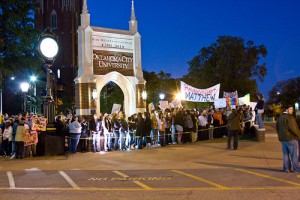Protest or Religious Gathering?
June 11th, 2015
Every time a group such as the Westboro Baptist Church (WBC) is in the news for some new, outrageous “protest” that their members engage in, many people wonder just how this organization is allowed under the law to do what it does. This often leads to discussions on other groups, whose messages and beliefs run counter to our societal norms. Many believe that it is because it is claiming to be a church, and that the U.S. Constitution protects its members’ actions pursuant to the religious freedom clauses of its text. That notion is not entirely correct, and what may come as a surprise to some is that the actions of the WBC, when its members make headlines such as this, are not protected under those clauses. What does protect such actions? Another portion of the same constitutional amendment, namely, the First Amendment’s free speech clause.
Freedom of Religion vs. Freedom of Speech
The First Amendment to the Constitution contains clauses that protect our rights to free speech, freedom of the press, freedom of peaceful assembly, and two clauses involving religion – i.e. free exercise clause and the establishment clause. Essentially, the First Amendment protects citizens against government actions that restrict their ability to speak freely and assemble with like minds, without a showing that it has an interest that lawfully trumps these rights. When members of the WBC, and other groups like them, engage in behavior that many may find reprehensible, we are reminded of the protections of the first amendment and why they are so important to uphold. What we do not have to do, however, is misclassify these groups and provide them with elevated status because their name may include a reference to a certain religion or religious group.
What the religion clauses of the first amendment protect are twofold; first, the ability of individuals to practice any religion (or no religion) without fear of government persecution, and second, that no one religion will be established as the official religion of the country. Nothing in these two provisions states that the rights of religious groups are greater than those of other citizens.
The free speech clause of the Constitution is actually that which provides groups such as the WBC the freedom to speak out against, or in favor of, a specific point of view. The Supreme Court has upheld the actions and speech of the WBC and others whose behavior is in their opinion disrespectful of others’ right to privacy. Most recently, the Supreme Court stated that the WBC’s actions are “certainly hurtful” yet it still upheld its members’ right to engage in free speech as “speech on public issues occupies the highest rung of the hierarchy of First Amendment values” and as such is entitled to special protection. The Court continued by stating that, while unpopular and hurtful, the WBC’s right to speak about its views is important to protect under the first amendment so as to prevent the whittling away of all citizens’ right to speak publicly on matters of public concern.
The Legacy of the First Amendment
Universal Life Church Case Law will continue to monitor any cases involving the first amendment to the Constitution, especially with regard to their potential impact on religious freedom.



